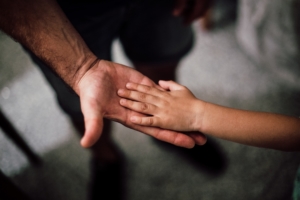The Significance of “Please” (and “Thank You”)

My wife and I were always together on the importance of training our five children to say “please” and “thank you,” but we were recently discussing why we held this to be such a central part of child training. Neither of us had ever viewed it as mere politeness or socially appropriate formality (even though these outcomes were not altogether unimportant to us or irrelevant to this discussion). Instead, we found our expectations and our corresponding training to be a vital part of revealing the condition of their hearts, addressing heart problems such as pride and covetousness, and preparing them to understand and appreciate God’s mercy and grace. We wanted our children to not only say “please” and “thank you,” but to actually be thankful, and never presumptuous—that is, we never wanted them to think or act as though they were entitled to the good things they were given, whether basic needs or non-essential wants.
It is true that children are dependent upon their parents. It is also true that parents have an obligation to provide their children with what they need (e.g., food, shelter, clothing, protection, instruction, and love). But these two facts do not add up to the conclusion that children have the right to expect, with an attitude of entitlement, to receive the good things they are given, as if their parents are merely “doing their job” by feeding, clothing, protecting, and loving them. Every good thing any of us receives in this life is a gift of God’s grace. Hence, everything we are given should be received without presumption and with thankfulness.
The parental obligation I’m choosing to stress in this article is the one to teach and train your children that for them to have or display an entitled, prideful, or covetous attitude, or to fail to be thankful, is to sin. While not the only way of accomplishing this teaching and training, one effective way is to train them to always, say “please” and “thank you,” and to insist that they adhere to your standard, not just at home, but at all times and in all settings. What’s said or done outwardly may not always indicate the true condition of the heart. But the true condition of the heart will often reveal itself through a child’s unwillingness, reluctance or even habitual forgetfulness to express verbally what the heart does not genuinely feel.
Training your children to say “please” is a way of training them to humbly acknowledge their station in life and entrust themselves to you, their parent. In other words, it is a way for them to put their needs and concerns in your hands, just like we, as believing adults entrust ourselves to God and his providence.
“Please” is not a “magic word” or a way of guaranteeing the desired outcome. Its origins are found in the phrase, “If you please,” or, “If it would please you to do so.” Rightly understood, when a child politely says “please” when verbalizing a request, he is humbly leaving the outcome to the parent’s will and wisdom. It means he trusts his parent to make the best decision, and that even if the parent says no (which parents must do at times), he will graciously accept that answer. It is his way of acknowledging that his parent loves him and knows what is best for him. Understanding this will require patient, repeated instruction, but it is good—I would even say necessary—to train children to say “please” long before they fully grasp its meaning and the implications of saying it. In my experience, it has a way of working its way inward over time.
When one of our children would come into the kitchen and loudly and urgently proclaim, “I’m thirsty!” my response would always be, “Nice to meet you, Thirsty! I’m Dad.” I would then go about my business as if nothing had been requested, because at that point nothing had been requested. All the child had done was complain about a feeling of thirst and implicitly demand that I address his discomfort. It was little different than the child saying, “I need water! Do your job and give me water!” No decent parent would ever deny a child water to quench his thirst, and my children were always guided to the right way to ask, including the proper attitude, then given what they needed. But I would have been unwise or complacent to cater to this kind of entitled, demanding approach by granting the request without applying the proper training.
Young children who are untrained in this way will covet and demand things like water (yes, a person can even covet water!) or toys or candy. Older children who were never properly trained will covet and demand things like money, privilege, and freedom from parental oversight. In either case the demeanor is a reflection of the heart, and it has a way of becoming the prevailing influence in the home, or later in life, with friends and future family. If not identified and dealt with early, attitudes of entitlement and ungratefulness have their way of grabbing hold and not letting go. On the other hand, the child who is trained to say “please,” and as a result progressively grasps and appreciates its meaning, will be more pleasant to be around, more content with his situation in life, and more humbly thankful for the good things he is given.
The logical complement to “please” is “Thank you.” The person who is genuine in his humble request is genuinely grateful when that request (not demand) is granted. It is a much easier principle to teach to children, and much easier for them to grasp and apply, but no less important in revealing the condition of the heart. When rightly understood and deeply felt, particularly with respect to God and his grace, it characterizes the person who is not far from his kingdom.

